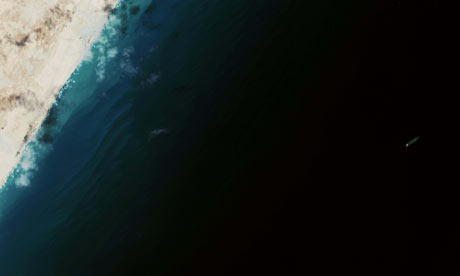An IKONOS satellite image of the pirated Saudi supertanker Sirius Star. Click on the magnifying glass to enlarge image. Photograph: GeoEye
From a vantage point 423 miles above the Earth, the lawless waters of the Gulf of Aden appear tranquil and the 330-metre-long ship sitting low under a £68m cargo looks like a tiny green cigar floating on an inky ocean.
These pictures, taken by a satellite commissioned by the Guardian and hurtling over Africa at four miles a second, show the Sirius Star, the Saudi supertanker which 12 days ago became the biggest prize ever seized by the Somali pirates who have claimed the Gulf of Aden as their hunting ground.
The images also reveal a triangle of ships, three of the 40 vessels to have been hijacked in Somali waters this year. Although not as vast as the Sirius Star, the Stolt Strength, the African Sanderling and the Yasa Neslihan are together home to 64 seafarers, two-thirds of them from the Philippines.
With the taking of the Sirius Star and its 25-strong crew a little before 9am on November 15, the number of international seafarers floating in hijack limbo off the coast of Somalia rose to almost 300 and the issue of piracy surged to the top of news bulletins around the world.
The multinational composition of the crew - 19 Filipinos, two Britons, two Poles, one Croat and one Saudi Arabian - may have guaranteed global coverage, but the Sirius's sheer size and huge, precious cargo proved equally arresting.
The ship, very nearly a third of a kilometre long from bow to stern, was carrying 2m barrels of oil from Saudi Arabia to the US, almost a quarter of the kingdom's daily oil production.
And although the pirates who swarmed up the side of the supertanker may have halved their original ransom demand to $15m (£9.8m), the situation is no closer to a resolution.
The Guardian's satellite pictures, which were shot a week ago, showed the Sirius Star five miles off the coast at a latitude of 4.595N and a longitude of 48.085E. But on Sunday, the hijackers moved the ship further offshore, apparently after receiving threats from Islamic militants in Somalia who were angry that a Muslim-owned ship had been targeted.
Two days ago the BBC spoke to a pirate on board the Sirius Star who said a ransom had not yet been set, adding that his men had not been contacted by the supertanker's owner.
The pirate, who identified himself as Daybad, said the crew were being treated as "prisoners of war". He added: "We captured the ship for ransom, of course, but we don't have anybody reliable to talk to directly about it."
The families of the seafarers aboard the other ships are still waiting for updates. Dr Fehmi Ulgener, a lawyer for the Turkish shipping company that owns the Yasa Neslihan, said the ship's 20 Turkish crew members were in good spirits.
"They have no health problems but they are bored, although that is to be expected. The company's personnel department is dealing with the crew's families and we are giving them information. At the moment, they are completely calm and are waiting for the good news," he said.
Ulgener said the pirates who attacked the ship, which was laden with 77,000 tonnes of iron ore, had "popped up out of the blue" at midday on October 29. Like many others, he had no idea how long the hijacking would go on. "Our only source is the other examples, and so [the situation] could last for between 60 and 70 days," he said.
The Panamanian company that took delivery of the African Sanderling just five months ago could not be reached yesterday. But a spokesman for Stolt-Nielsen, the Norwegian-Luxembourgeois company that charters the Stolt Strength, said he believed the ship's 23-strong Filipino crew were well despite their 17-day ordeal. "If there's any silver lining, it's that these pirates don't seem to be out to harm the crew," said Martin Baxendale. "It's purely a financial thing, but it's extremely distressing for the families of the crew. And although they're not setting out to hurt the crew, accidents do happen."
The company is all too familiar with Somalia's hijacking problem: 12 days ago, the crew of another of its ships, the Stolt Valor, was released after a hijacking that lasted more than two months. "In humanitarian terms, it's very unpleasant," Baxendale added. "The sooner we get them out the better."
Two Western journalists, believed to be a Briton and a Spaniard, were kidnapped en route to the airport in the port city of Bosasso on Somalia's northern coast yesterday.





No comments:
Post a Comment